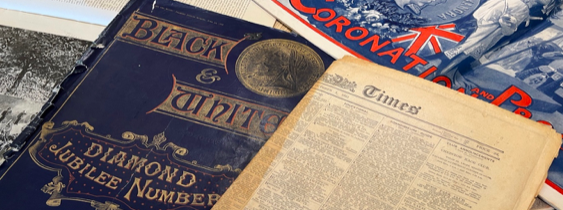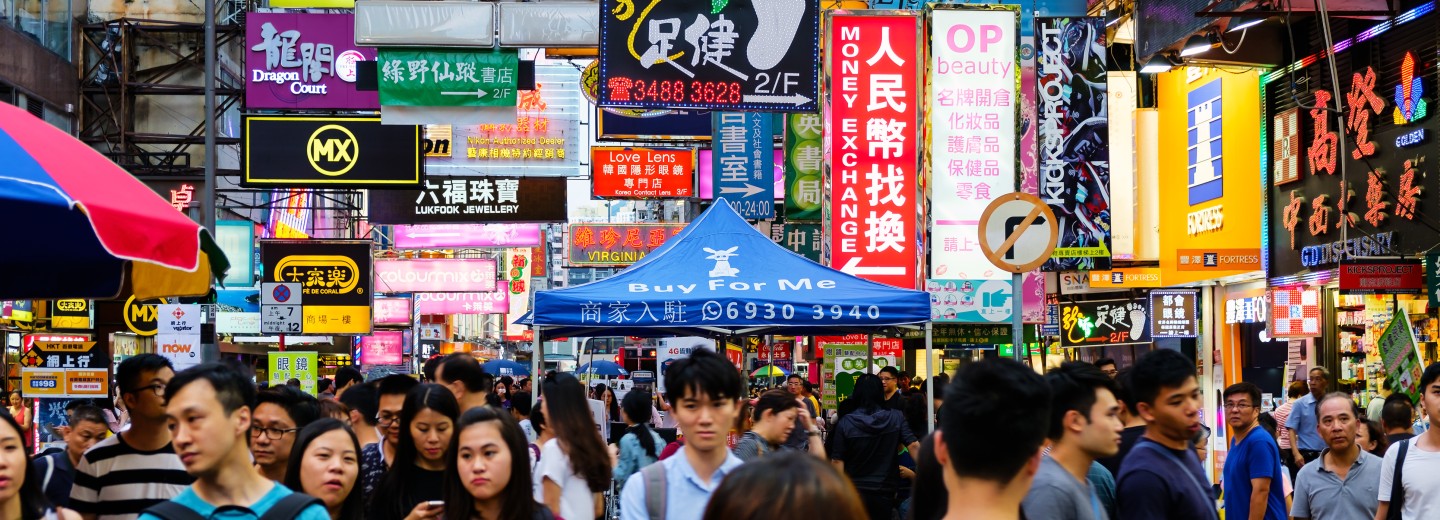A future Hong Kong
Among the many fascinating papers my grandmother collected is a selection of popular news supplements about important events in the lives of the British Royal family. There is one, for example, celebrating Queen Victoria’s Diamond Jubilee in 1897. My grandmother, aged 14, attended the celebrations in London. Others cover the coronation of George V in 1902, his funeral in 1935 and the coronations of Edward VIII and George VI in rapid succession thereafter.

They all read much the same. The language is sycophantic. Writers vie with each other in their superlative praise. Nobles and dignitaries feature in profusion. Tributes pour in from the British Empire, along with colonial officials and representatives – almost all of British origins.
What about Hong Kong?
In all this writing, Hong Kong is mentioned just once, sending ‘a few policemen’ to Queen Victoria’s Diamond Jubilee. Perhaps this should not surprise us. After all, the British navy only claimed Hong Kong as the Queen’s colony in 1841, when Victoria was just 22 and had been on her throne for a mere four years. How could a tiny island off the southern coast of China possibly be of importance to anyone?
Yet, for another small island off the northern coast of Europe, Hong Kong was strategically very important. The British Empire may have grown haphazardly. But, for centuries, sound naval strategy had been essential for Britain’s survival. Hong Kong fitted perfectly in the chain of naval bases that stretched from Gibraltar and Malta to Mumbai and Singapore and then, Australia.

But there were unintended consequences – as always - about Britain’s acquisition of Hong Kong. The Colony took on a life of its own that included more than merely being a safe (fragrant) harbour for the British Navy. “I wonder why,” wrote the young Chinese revolutionary, Sun Yat-Sen, “Englishmen could do such things as they have done with the barren rock of Hong Kong within 70 or 80 years, while, in some 4,000 years, China had achieved nothing like it.” It was said elsewhere of the British in Hong Kong that they had cut a notch in China, as a woodsman marks a tree, to mark it for felling at a convenient opportunity.” The British had marked the tree of China but, somehow, never got around to annexing China for the Empire.
“The great men of Hong Kong,” wrote the late James (Jan) Morris in the wonderful ‘Pax Britannica’, “were the taipans, the British merchants who had been in the colony from the beginning and had never relaxed their grip upon its trade. They lived very grandly, sometimes in Hong Kong, sometimes in country houses at home in England. Their firms were household names throughout the east, Jardine Matheson, Butterfield Swire, names which spanned the generations and seemed changeless constituents of eastern life.”

James Morris continues:
The taipans were opportunists by definition, quick, clever, rich men who had absorbed some of the Chinese qualities themselves in so many years upon the coast and who were there not for the sake of the empire, still less to undertake a share of the White Man's Burden, but to maintain their annual profits. Their attitudes were imperial nonetheless and often dazzled foreign visitors by sheer hubris. The colour bar in Hong Kong was absolute and the British held themselves almost psychotically aloof from the swarming Chinese who were their workforce. They seldom spoke Chinese, and to heighten the lordly effect their servants talked to them in pidgin English, a literal translation from the Cantonese which gave their employees an air of childlike dependency. The British residents of Hong Kong genuinely, without affectation, thought of the Chinese as foreigners in the colony and themselves as true natives.
Fast forward - 2022
I was privileged recently to be a panel member and speaker at the first of three online conferences organised by GIFT (The Global Institute for Tomorrow) about the future of Hong Kong. Keynote speakers included Dr Martin Jacques, the well-known author of ‘When China Rules the World’ and Christine Loh, former Hong Kong legislator turned academic.
Unlike in my grandmother’s carefully saved souvenir supplements, Hong Kong receives more attention today than ever before. Apart from its eminence as one of the world’s most important financial and tourism centres, Hong Kong has suffered in the last three years from severe civil unrest, the COVID epidemic and the USA-China dispute about which of them, if any, should run the world. Furthermore, it is 25 years since China resumed sovereignty over the former British colony of Hong Kong which became a Special Administrative Region (SAR) of China. Politicians and the media like to mark these superficial numerical milestones.
Hong Kong has re-invented itself many times before in the face of apparently terminal problems. All the speakers at the conference agreed that it will do so again. Speakers put forward many valid ideas about how Hong Kong might achieve a renaissance. The word used was ‘re-set’.

However, probably the most important issue is also the most intractable - culture. For the last 150 years, British policy has been to induce Hong Kong people and the Hong Kong Government to look down on the government and people of Mainland China. British civil servants occupied every senior post in the Hong Kong government until the 1980’s. Civil servants could not even visit China legally. British citizens ran all the major companies in Hong Kong. Hong Kong people were studiously indoctrinated to feel inferior to the British by the same philosophy to which James Morris refers.
Until recently, mainland China was well behind Hong Kong in sophistication, skills, and international outlook. Even 25 years ago, when China resumed sovereignty, Hong Kong’s GDP represented 18% of the mainland’s economy. Today it is down to 3%. By virtue of their ‘British’ upbringing, and Hong Kong’s economic progress, it was inevitable that Hong Kong people should feel superior to their brothers and sisters on the Chinese mainland. This was also, in effect, the de facto policy of the former colonial administration that instantly became the SAR government on 1 July 1997. Despite the change in relative GDP, little has changed in the last 25 years. In retrospect, the tensions that exist today between the SAR and Beijing were inevitable.
What to do?
Among the many tasks needing attention, I pick out these three:
- Prosperity is a wonderful thing. With it, life feels good: one can take risks: one can forgive small irritations: all becomes possible. The first task for Hong Kong people and the SAR government is to work together, as they always have done, to restore prosperity for everyone in Hong Kong. The PRC government is committed to this. The Greater Bay Area, with a GDP larger than most countries, is Hong Kong’s great new opportunity to move forward. Hong Kong’s globally connected service economy brilliantly complements southern Guangdong’s technical and manufacturing prowess.
- Broad, international, education for Hong Kong’s future citizens and leaders is vital. And yes, no apologies, this must include ‘patriotic’ education. Just as schools in the west now teach pupils about gender and racial diversity, so Hong Kong needs to adjust its curricula to pay respect to China’s ancient civilisation and values – as well as teaching life skills and empathy for other cultures in today’s world.
- Above all, Hong Kong is an international city. Travel, immigration, and emigration have been part of its success from its establishment 175 years ago. Change is a must. New people, new blood, new ideas – all contribute to its vitality and regeneration. Hong Kong must continue to offer its warm welcome to tourists, job seekers and visitors of all backgrounds. Every arrival – and every departure – brings fresh opportunities.

Conclusion
Hong Kong was an insignificant part of China for millennia. Now, from a small, forcibly obtained, insignificant dot in the British Empire, it is Chinese again. As the global dominance of western ‘empires’ declines, China grows once more.
As it has always done, Hong Kong must, and will, determine how best to survive and prosper.
Worked on the article:

Wanlikhang





